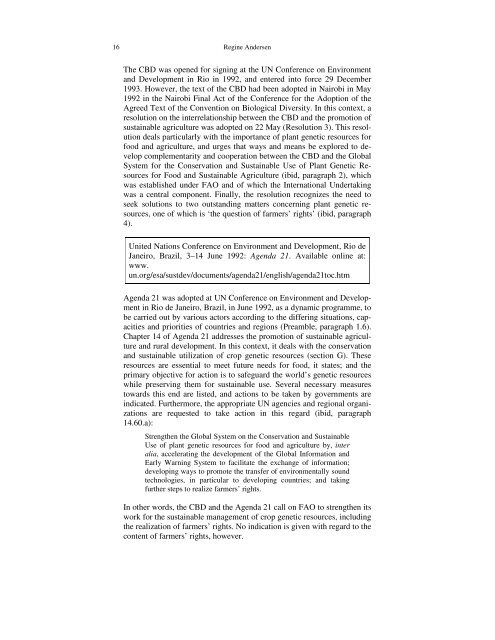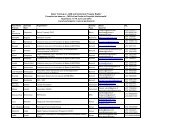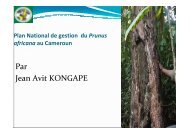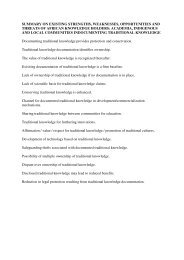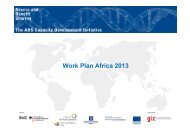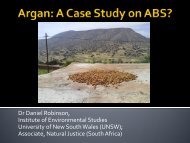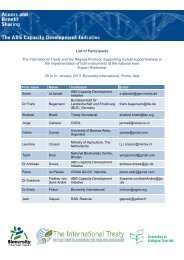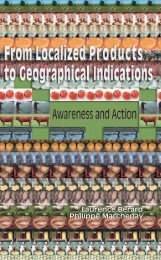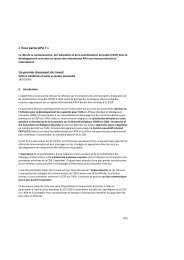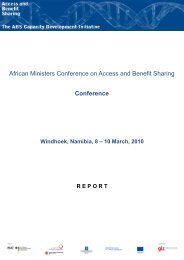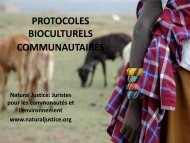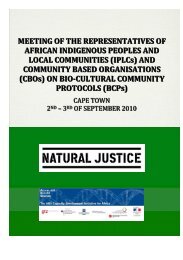The History of Farmers' Rights - Fridtjof Nansens Institutt
The History of Farmers' Rights - Fridtjof Nansens Institutt
The History of Farmers' Rights - Fridtjof Nansens Institutt
Create successful ePaper yourself
Turn your PDF publications into a flip-book with our unique Google optimized e-Paper software.
16 Regine Andersen<br />
<strong>The</strong> CBD was opened for signing at the UN Conference on Environment<br />
and Development in Rio in 1992, and entered into force 29 December<br />
1993. However, the text <strong>of</strong> the CBD had been adopted in Nairobi in May<br />
1992 in the Nairobi Final Act <strong>of</strong> the Conference for the Adoption <strong>of</strong> the<br />
Agreed Text <strong>of</strong> the Convention on Biological Diversity. In this context, a<br />
resolution on the interrelationship between the CBD and the promotion <strong>of</strong><br />
sustainable agriculture was adopted on 22 May (Resolution 3). This resolution<br />
deals particularly with the importance <strong>of</strong> plant genetic resources for<br />
food and agriculture, and urges that ways and means be explored to develop<br />
complementarity and cooperation between the CBD and the Global<br />
System for the Conservation and Sustainable Use <strong>of</strong> Plant Genetic Resources<br />
for Food and Sustainable Agriculture (ibid, paragraph 2), which<br />
was established under FAO and <strong>of</strong> which the International Undertaking<br />
was a central component. Finally, the resolution recognizes the need to<br />
seek solutions to two outstanding matters concerning plant genetic resources,<br />
one <strong>of</strong> which is ‘the question <strong>of</strong> farmers’ rights’ (ibid, paragraph<br />
4).<br />
United Nations Conference on Environment and Development, Rio de<br />
Janeiro, Brazil, 3–14 June 1992: Agenda 21. Available online at:<br />
www.<br />
un.org/esa/sustdev/documents/agenda21/english/agenda21toc.htm<br />
Agenda 21 was adopted at UN Conference on Environment and Development<br />
in Rio de Janeiro, Brazil, in June 1992, as a dynamic programme, to<br />
be carried out by various actors according to the differing situations, capacities<br />
and priorities <strong>of</strong> countries and regions (Preamble, paragraph 1.6).<br />
Chapter 14 <strong>of</strong> Agenda 21 addresses the promotion <strong>of</strong> sustainable agriculture<br />
and rural development. In this context, it deals with the conservation<br />
and sustainable utilization <strong>of</strong> crop genetic resources (section G). <strong>The</strong>se<br />
resources are essential to meet future needs for food, it states; and the<br />
primary objective for action is to safeguard the world’s genetic resources<br />
while preserving them for sustainable use. Several necessary measures<br />
towards this end are listed, and actions to be taken by governments are<br />
indicated. Furthermore, the appropriate UN agencies and regional organizations<br />
are requested to take action in this regard (ibid, paragraph<br />
14.60.a):<br />
Strengthen the Global System on the Conservation and Sustainable<br />
Use <strong>of</strong> plant genetic resources for food and agriculture by, inter<br />
alia, accelerating the development <strong>of</strong> the Global Information and<br />
Early Warning System to facilitate the exchange <strong>of</strong> information;<br />
developing ways to promote the transfer <strong>of</strong> environmentally sound<br />
technologies, in particular to developing countries; and taking<br />
further steps to realize farmers’ rights.<br />
In other words, the CBD and the Agenda 21 call on FAO to strengthen its<br />
work for the sustainable management <strong>of</strong> crop genetic resources, including<br />
the realization <strong>of</strong> farmers’ rights. No indication is given with regard to the<br />
content <strong>of</strong> farmers’ rights, however.


